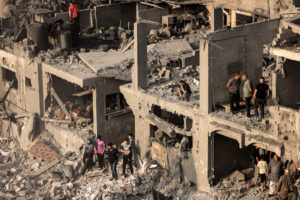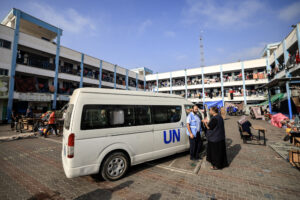
- ARAB NEWS
- 03 Jul 2025

DUBAI: A UN relief official mourning the loss of over 100 colleagues is demanding an immediate ceasefire to relieve Gaza from its five weeks of “hell,” warning that “no place is safe” as Israel tightens its siege of the impoverished Palestinian enclave.
Juliette Touma, director of communications at the UN Relief and Works Agency, also says that Israeli restrictions on the flow of fuel have become its latest “weapon of war” impeding the aid agency’s capacity to operate.
“It is unacceptable for a UN agency the size of ours, or any humanitarian agency, to be begging for fuel,” she said on the Arab News current-affairs show “Frankly Speaking,” adding: “This is unacceptable, in fact, unbelievable, because we need fuel for humanitarian purposes, and we’ve not had fuel for the past five weeks.”
Recently, UNRWA announced that it would be forced to stop its life-saving work at Gaza because it no longer has access to fuel. This means for the first time in 75 years, the largest aid agency operating out of Gaza is no longer able to cater to the 780,000 Palestinians that it has been offering shelter to.
On Wednesday Israel permitted 24,000 liters of diesel to cross into Gaza from Egypt but with the provisos that the fuel should neither be used in hospitals nor to service UN aid trucks operating in Gaza.

“What happened recently with this very tiny shipment of fuel, will only allow us to bring in the supplies. And then what do we do? We just sit there and look at the supplies? We need to distribute them,” she said.
“For that, we need fuel, and we need it urgently, not only for UNRWA, but for other humanitarian organizations working on the ground in Gaza. If not, then people will die.”
Fuel shortages are also hitting communications services. Palestinian telecommunication company Paltel gave warning on Wednesday that with its generators running dry, it had just a few days left before it too would be forced to stop operations. And, before coming on air, Touma received word of “another total (communications) blackout,” the fourth since the war began.
“The issue of telecommunications is extremely severe,” said Touma. “Blackouts mean we lose contact with our colleagues on the ground. People inside Gaza lose contact with each other. They will not be able to call ambulances. The ambulances cannot reach them because there is no fuel. And they feel further and further isolated and abandoned and cut off from each other and from the rest of the world.”
In an effort to improve the situation on the ground, the White House recently announced that it had negotiated a daily four-hour pause in the fighting, apparently to ease the flow of aid. But according to Touma, it simply is not enough, as she stressed what was “really, really, really needed” is a ceasefire.
“It has been five weeks of hell for people in Gaza,” she said. “It’s time for a ceasefire. It’s time for the siege to be lifted. It’s time for supplies to go in on a regular basis. It’s time. It’s overdue. For the sake of our humanity and whatever is left of our humanity, there has to be a ceasefire. There has to be.”
So far, those calls for a ceasefire have fallen on deaf ears. In fact, continuing with its purported efforts to rout Hamas, the Israeli Defense Forces have stepped up attacks on critical Gazan infrastructure, with a series of strikes against its largest medical facility Al-Shifa Hospital, followed by IDF forces storming the hospital grounds. This despite the prohibition of attacks on hospitals under the rules of armed conflict.

Condemning such a flagrant violation of international law, Touma said alongside its usual duties, Al-Shifa Hospital was sheltering tens of thousands of people at the time of the IDF assault. Even before the raid, she said that efforts to properly source the hospital had been hobbled, with UNRWA only having reached it three weeks into the conflict.
“We only had a breakthrough a couple of weeks ago with the World Health Organization, where we finally were allowed to get to Al-Shifa and deliver much-needed medical supplies and emergency medicines,” Touma said. “But that was it. In more than a month, this is what we were allowed to do. Medical facilities, hospitals included, are protected by international law, and they should be protected at all times, including during conflict.”
Asked if she or her colleagues or associates had seen any evidence that Hamas is using Al-Shifa Hospital as a base, Touma declined to comment, saying: “I do not have the information and … we are not military experts.”
Compounding Touma’s anger are the personal losses she and the wider UNRWA team have suffered. Among the more than 11,500 killed so far killed in the conflict are 103 of her colleagues, marking it as the deadliest for the UN in its 78-year history. Each day, she added, another member of the team seems to die, with those updates the “most horrific” that she receives.
“When that list comes in, my heart starts pounding, really, because it’s the most dreadful news to know that yet another colleague was killed under really, really horrific circumstances,” said Touma. “Many of those colleagues of ours were killed with their families. We have whole families being wiped out in different parts of the Gaza Strip since this started. So, it is really horrific.”
Indeed, this week saw UN flags around the world lowered to half-mast in memory of those lost. In Gaza, however, the decision was made to keep the flag flying as a sign of how dedicated UNRWA was to the mission its colleagues sacrificed their lives for.

“It is our dedication to the communities who came to take shelter and protection under the very same UN flag. And it’s an honor to them,” Touma told Katie Jensen, the host of “Frankly Speaking.”
“It’s a show of commitment that UNRWA is there to help to the (highest) degree possible, knowing how many challenges we are facing day in, day out. (But) we are not able to do the very minimum we’re supposed to do for the people who came to seek shelter with us.”
Failing to provide shelter, though, is very much in keeping with Israel’s perceived disregard for the laws of war, with UN agencies also being hit by IDF munitions. Last week alone, the Israeli navy hit an UNRWA guest house, which sleeps its staff, in Rafah three times. Leaving Israel’s claim that southern Gaza offered safe haven for displaced Palestinians in tatters.
“Nowhere is safe. Nowhere is safe in Gaza, not the north, not the middle areas, not the southern areas,” Touma said. “There’s this myth going around that the south is safer. That’s not true. One third of our colleagues who were killed, they were killed in the middle areas and in the southern areas.
“Of the facilities, the UNRWA facilities that were impacted and damaged during the war, more than 70 percent were not in the north. They were in the south. They were in the middle areas. So, nowhere is safe and no place has been spared. Not even UN facilities, not even hospitals.”
Amid all this, Touma’s team are somehow expected to work. Noting its increasing mental and emotional toll, she said that everyone at UNRWA is “shell-shocked at what is happening,” pointing to both the volume and speed of the level of destruction occurring in Gaza.

“It’s beyond belief and it’s unprecedented,” continued Touma. “And the exodus that we have seen over the past few days, this river of people, people moving from the north of Gaza, including Gaza City, toward other areas, the middle and the south, this exodus for many, many people meant either reliving the trauma of 1948 or living through the traumas and the war of 1948 that their parents, their ancestors lived through.”
Yet there is also a third group. Survivors of 1948 who were never forced to leave. This group is now facing up to the barbarity of being displaced and “forced to leave their homes.” In Touma’s view, it is important to highlight the trauma.
It is a fact that there is a tendency to “undermine” the impact of trauma on survivors of conflict, she said, but it is “something that will accompany people for years to come.”
Asked whether UNRWA Commissioner General Philippe Lazzarini was right to urge the Arab League to push for a ceasefire — and whether Israel was willing to listen —Touma’s response was unequivocal.
“We need to knock on every door and leave no stone unturned, and continue with the advocacy, continue with the efforts so that we are reaching a ceasefire,” she said.
“This is what is very much needed at the moment. So, all efforts need to be exerted to reach that. It is time for a ceasefire in Gaza. It has got to come to an end. The level of destruction and the volume of destruction is just huge. It is time for this war to come to an end.”